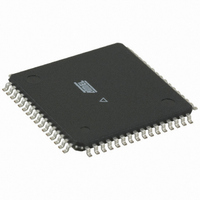ATMEGA64A-AU Atmel, ATMEGA64A-AU Datasheet - Page 225

ATMEGA64A-AU
Manufacturer Part Number
ATMEGA64A-AU
Description
MCU AVR 64K ISP FLASH 64-TQFP
Manufacturer
Atmel
Series
AVR® ATmegar
Datasheets
1.ATMEGA64A-MUR.pdf
(21 pages)
2.ATMEGA64A-AU.pdf
(392 pages)
3.ATMEGA64A-AU.pdf
(3 pages)
Specifications of ATMEGA64A-AU
Core Processor
AVR
Core Size
8-Bit
Speed
16MHz
Connectivity
I²C, SPI, UART/USART
Peripherals
Brown-out Detect/Reset, POR, PWM, WDT
Number Of I /o
53
Program Memory Size
64KB (32K x 16)
Program Memory Type
FLASH
Eeprom Size
2K x 8
Ram Size
4K x 8
Voltage - Supply (vcc/vdd)
2.7 V ~ 5.5 V
Data Converters
A/D 8x10b
Oscillator Type
Internal
Operating Temperature
-40°C ~ 85°C
Package / Case
64-TQFP, 64-VQFP
Package
64TQFP
Device Core
AVR
Family Name
ATmega
Maximum Speed
16 MHz
Operating Supply Voltage
3.3|5 V
Data Bus Width
8 Bit
Number Of Programmable I/os
53
Interface Type
SPI/USART
On-chip Adc
8-chx10-bit
Number Of Timers
4
Processor Series
ATMEGA64x
Core
AVR8
Data Ram Size
4 KB
Maximum Clock Frequency
16 MHz
Maximum Operating Temperature
+ 85 C
Mounting Style
SMD/SMT
3rd Party Development Tools
EWAVR, EWAVR-BL
Development Tools By Supplier
ATAVRDRAGON, ATSTK500, ATSTK600, ATAVRISP2, ATAVRONEKIT
Minimum Operating Temperature
- 40 C
Cpu Family
ATmega
Device Core Size
8b
Frequency (max)
16MHz
Total Internal Ram Size
4KB
# I/os (max)
53
Number Of Timers - General Purpose
4
Operating Supply Voltage (typ)
3.3/5V
Operating Supply Voltage (max)
5.5V
Operating Supply Voltage (min)
2.7V
Instruction Set Architecture
RISC
Operating Temp Range
-40C to 85C
Operating Temperature Classification
Industrial
Mounting
Surface Mount
Pin Count
64
Package Type
TQFP
For Use With
770-1007 - ISP 4PORT ATMEL AVR MCU SPI/JTAG
Lead Free Status / RoHS Status
Lead free / RoHS Compliant
Available stocks
Company
Part Number
Manufacturer
Quantity
Price
Company:
Part Number:
ATMEGA64A-AU
Manufacturer:
ATMEL
Quantity:
4 500
Company:
Part Number:
ATMEGA64A-AU
Manufacturer:
Atmel
Quantity:
900
Company:
Part Number:
ATMEGA64A-AU
Manufacturer:
ATMEL85
Quantity:
900
Part Number:
ATMEGA64A-AU
Manufacturer:
AT
Quantity:
20 000
21.8
8160C–AVR–07/09
Multi-master Systems and Arbitration
Note that data is transmitted both from Master to Slave and vice versa. The Master must instruct
the slave what location it wants to read, requiring the use of the MT mode. Subsequently, data
must be read from the slave, implying the use of the MR mode. Thus, the transfer direction must
be changed. The Master must keep control of the bus during all these steps, and the steps
should be carried out as an atomic operation. If this principle is violated in a multimaster system,
another master can alter the data pointer in the EEPROM between steps 2 and 3, and the mas-
ter will read the wrong data location. Such a change in transfer direction is accomplished by
transmitting a REPEATED START between the transmission of the address byte and reception
of the data. After a REPEATED START, the master keeps ownership of the bus. The following
figure shows the flow in this transfer.
Figure 21-19. Combining Several TWI Modes to Access a Serial EEPROM
If multiple masters are connected to the same bus, transmissions may be initiated simultane-
ously by one or more of them. The TWI standard ensures that such situations are handled in
such a way that one of the masters will be allowed to proceed with the transfer, and that no data
will be lost in the process. An example of an arbitration situation is depicted below, where two
masters are trying to transmit data to a slave receiver.
Figure 21-20. An Arbitration Example
Several different scenarios may arise during arbitration, as described below:
• Two or more masters are performing identical communication with the same slave. In this
• Two or more masters are accessing the same slave with different data or direction bit. In this
case, neither the slave nor any of the masters will know about the bus contention.
case, arbitration will occur, either in the READ/WRITE bit or in the data bits. The masters
trying to output a one on SDA while another master outputs a zero will lose the arbitration.
S
SDA
SCL
S = START
Transmitted from master to slave
SLA+W
TRANSMITTER
Device 1
MASTER
A
TRANSMITTER
Device 2
MASTER
Master Transmitter
ADDRESS
Device 3
RECEIVER
SLAVE
A
Rs = REPEATED START
Rs
Transmitted from slave to master
........
SLA+R
Device n
V
CC
A
Master Receiver
R1
ATmega64A
DATA
R2
P = STOP
A
P
225















